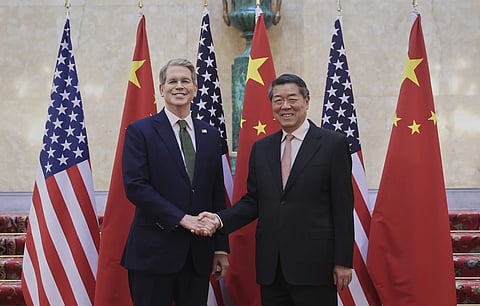

Senior delegations from the United States and China met in London on Monday in an effort to stabilise a fragile ceasefire in their ongoing trade dispute, which has unsettled global markets and raised fears of a broader economic downturn. Talks in London are likely to continue, according to officials familiar with the matter.
The Chinese delegation, led by Vice-Premier He Lifeng, held discussions at Lancaster House — a grand 19th-century mansion near Buckingham Palace — with US Commerce Secretary Howard Lutnick, Treasury Secretary Scott Bessent, and Trade Representative Jamieson Greer. China’s Commerce Minister Wang Wentao was also part of the talks.
Whether the London discussions yield concrete progress remains to be seen, but officials on both sides suggest that momentum has returned — at least for now — to what has been one of the most consequential and fraught economic dialogues of the decade.
The meetings mark the latest attempt to keep alive a tentative agreement struck in May, when both nations agreed to a 90-day suspension of the punishing 100%-plus tariffs imposed during their escalating trade war. That truce was reached during negotiations in Geneva last month, which offered a brief respite in a conflict that has disrupted supply chains, hit corporate earnings, and contributed to slower global growth.
Since the Geneva agreement, however, tensions have flared anew over issues ranging from restrictions on advanced semiconductor exports — crucial for artificial intelligence development — to US visa curbs on Chinese students, and China's tightening control over exports of rare earth elements vital to the tech and automotive sectors.
China’s exports to the United States plunged 35 percent in May compared with a year earlier, according to Chinese customs data — a stark reflection of the trade friction’s economic impact.
A major focus of the London discussions is the ongoing dispute over rare earth elements — a group of 17 minerals essential for everything from electric vehicles and smartphones to military hardware. In April, Beijing imposed new licensing requirements on the export of seven key rare earths, triggering concern among manufacturers worldwide.
Automakers in particular have raised the alarm, warning that dwindling stockpiles could lead to production slowdowns or even temporary factory shutdowns. The move has drawn sharp responses from both American and European firms.
In a gesture seen as conciliatory, Beijing signalled on Saturday that it is open to addressing some of the concerns voiced by international partners. US economic adviser Kevin Hassett told CNBC on Monday that he expected “a short meeting with a big, strong handshake” on rare earths, hinting at a possible breakthrough.
The latest round of negotiations comes just days after President Donald Trump and Chinese leader Xi Jinping spoke by phone in an effort to steady deteriorating ties. Trump later announced on social media that trade talks would resume in London — a decision welcomed by markets and policymakers alike.